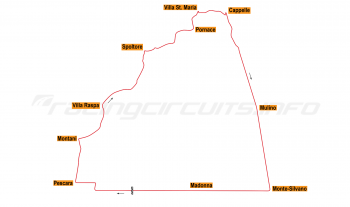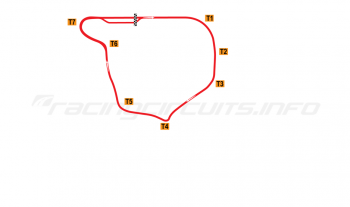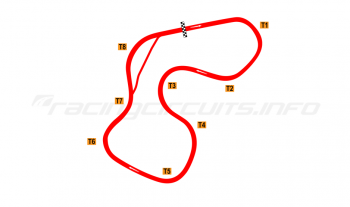Savannah
Circuit Overview
A most unusual facility nestles on Hutchinson Island in Savannah, Georgia; a stretch of public road, owned by the City Government, which also doubles up as a race circuit, having been purpose-designed for racing.
This rare beast of a facility was built in the 1990s with the aim of one day hosting an IndyCar race. In the event, it did host a 'taster' event in 1997 for the secondary Indy Lights series, won by Helio Castroneves, before the race promoter went bust and the track was mothballed.
Fast forward a decade and the track was revived as part of the Hilton Head Island Concours d'Elegance event, with the Speed Week become a firmly established gathering with associated historic racing. However, development on the island seems to have put an end to these events, with the organisers declaring the track no longer safe to use, cancelling the event for good in 2021.
Circuit History
Historic Savannah, set in the heart of the Deep South, is probably as unlikely a place as you can think of to have deep associations with speed and, in particular, single seater racing. However, the city is actually the birthplace of Grand Prix racing in America.
Way back in 1908 the unpaved roads of the city were turned over to racing for the 'American Grand Prize', when some of the top racers of the day took part in front of crowds so big that soliders were brought in to serve as human barricades. Three further races were held (in 1910 and twice in 1911; once for the Grand Prix and once for the most prestigious prize in American racing, the Vanderbilt Cup) on a 25 mile course just south of the city itself but as quickly as the event came, it departed equally quickly, the Grand Prix contingent moving on Milwaukee in 1912.
For the next 85 years the city's racing past would tend to be an almost forgotten slice of history. However, in the 1990s, a group of local businessmen formed the Colonial Motorsport company, deciding it was time to bring back the racing action. After four years of careful negotiations, agreement was reached for a stand-alone race of the Indy Lights series in 1997, with follow up events in '98 and '99 offering the possibility of a future CART round.
Public roads are designed to form a circuit
The opportunity for the race arose out of the redevelopment of Hutchinson Island a landmass in the Savannah River directly opposite the historic downtown area. For years its only use had been industrial, in support of the Port of Savannah, but in the 1990s a public-private partnership began to build a convention centre and hotel. Public money to the tune of $10 million was put in to create a new road network on the island and it was these roads that would house the race. CART officials, including former chief steward and former driver Wally Dallenbach helped design a 1.965-mile county road to serve as a 10-turn circuit – the first time a public road had been pre-designed with the intention of also using it for racing in the USA.
A notable feature of the new course was the Turn 1 and Turn 2 area, which was a fast low-banked sweeping left hander configured in a similar fashion to an oval turn, offering several distinct racing lines and the possibility of side-by-side action. The rest of the course featured wide and smooth roads, with temporary grandstands lining the course.
The track was completed just in time for the May running of the inaugural Indy Lights Dixie Crystals Grand Prix, with support races for Barber Saab and the North American Touring Car Championship. Before of a race day crowd of over 30,000, Helio Castroneves ran out the winner in the feature race.
The track received the thumbs up from former F1 driver Mark Blundell, who was competing in the touring car race. "As a drivers track, it's good," he said. "It's quite demanding and really physical. It's a fun circuit to drive, and there are at least two and possibly three spots for overtaking. It doesn't have a street course feel — it's more of a road course feel. From a spectator viewpoint, there are plenty of great vantage points."
On paper the event looked a modest success; drivers seemed happy with the course, fans turned out in reasonable numbers and a contract was in place for future years. However, as many a race promoter has found out, it takes time to generate a profit and this was time Colonial Motorsport's creditors were unwilling to give. Several companies involved in the construction filed suit to recoup some $3.3 million in monies owed, sending Colonial into bankruptcy. The track itself came into public ownership as a result but all hopes of continuing to hold a race were gone. The 1997 Indy Lights race would be the only running.
So it was that, after one race, the Savannah course was mothballed. The roads were open to the public (albeit with 35 mph signs all around it) and, in due course, the convention centre, hotel and country club were completed. The track was more likely to reverberate to the sound of gentle chirping of birds than engines, though there were occasional (and illegal) hot laps put in by local youths.
After a decade's silence, the track comes back to life
Plans for an ARCA race on the track came to nought, but after several years of trying, the course did in fact get a second lease of life. In 2008 the organisers of the Hilton Head Island Concours d'Elegance in nearby South Carolina elected to create a new event Savannah, holding a speed week which culminated with races for historic sportscars.
The Savannah Speed Week had become a big success, becoming an annual fixture at the end of October, with races organised by Historic Sportscar Racing Limited and using a refurbished version of the 1997 Indy Lights course, known as the Grand Prize of America Circuit.
Sadly, the 2020 event was cancelled due to the coronavirus pandemic but the Speed Week was expected to return in 2021. However, in a statement, the Hilton Head Island Concours d'Elegance made the surprise announcement that the event was to be cancelled: "With recent changes to the track to prepare for new development on Hutchinson Island, the Hilton Head Island Concours d’Elegance has significant concerns about the ability to provide a safe venue for competitors, spectators, volunteers and on-site management and, as a result, have decided to cancel the 2021 Savannah Speed Classic."
It seems unlikely that the event will be revived, so the sound of racing engines on the islands roads may well have reverberated for the final time, unless someone else steps forward to organise them.
Jump onboard
Get your race tickets!
Brought to you with: 
We've teamed up with Motorsports Tickets to bring you the best deals for Formula One, MotoGP, Le Mans and more.









